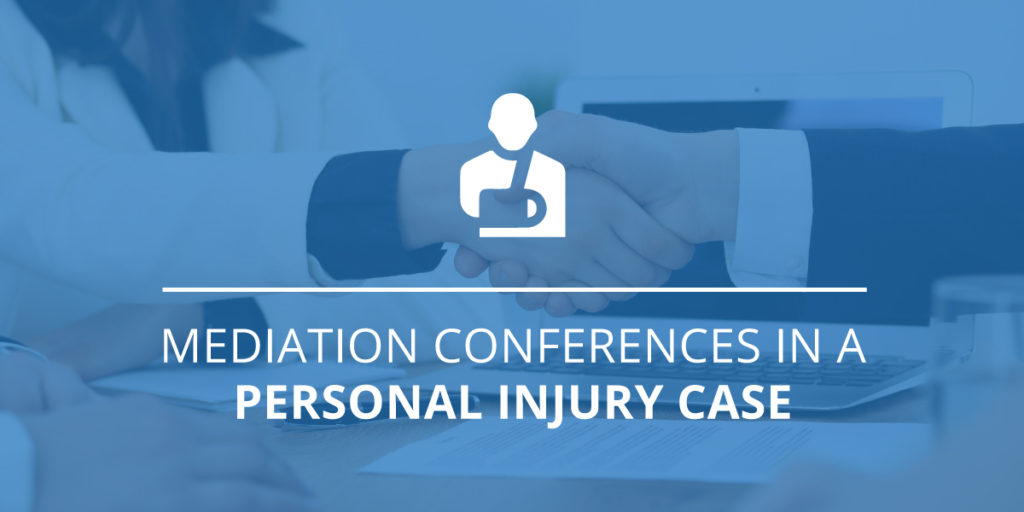
When the general public pictures a personal injury case, they tend to imagine two lawyers battling it out in a courtroom in front of a judge. However, this is rarely the case. In fact, your personal injury lawsuit may end up in a mediation conference.
What is a Mediation Conference?
In its simplest form, a mediation conference is a meeting in which the parties involved in the personal injury case try to come to a settlement. The conference is generally led by a mediator – an unbiased individual who will help to keep the conversation on track.
The mediator will usually have received specialized training to prepare them for their role. Often, they are retired Judges who have years of experience presiding over personal injury and other civil cases.
What Happens During a Mediation Conference?
Because mediation conferences are fairly informal in nature, there are few specific rules or regulations that they must follow. Every Mediator has their own style and method of mediating cases. However, a general outline of a normal mediation conference might look a little something like this:
- Introduction: The mediator welcomes both parties and their respective personal injury lawyers to the conference.
- Mediation Orientation: The mediator explains how the mediation process works and goes over a few ground rules.
- Case Presentation: Each party gets a chance to explain their side of the story without being interrupted. Exhibits and witnesses are likely to be allowed during this phase of the proceedings. As both sides have usually briefed the Mediator on the case beforehand, many of them choose not to go over this again or ask if there are any additions, corrections or areas previously briefed that the Parties want to stress. There may be information or strategies that a party wishes to withhold at this point for tactical reasons.
- Party Separation: Each party is moved into a separate private office. The mediator moves back and forth between them to negotiate the case and hopefully reach a settlement. What is said in private remains between the Mediator and the party unless the Mediator asks for, and is given, specific permission to release the information to the other side.
- Settlement Agreement: If the two parties are able to come to a settlement agreement, they will sign an enforceable contract outlining the terms of the settlement. If not, the case moves forward as if the Mediation had never occurred. It can also be the case that the Parties continue to negotiate based on groundwork laid by the Mediator and come to a settlement short of having to take the case to Trial.
Though it is possible for a mediation conference to result in a settlement agreement in just a few hours, they can also last quite a bit longer. It is not unusual for the mediation process to take weeks or even months. The length of the process will usually depend on the complexity of your case as well as the speed of negotiation.
What are the Advantages of Mediation Conferences?
There are quite a few advantages to mediation, such as:
- Privacy: Mediation is almost always a confidential process. Courtroom proceedings, on the other hand, are usually open to the public.
- Speed: Waiting for a personal injury case to make its way to court can potentially take years. The mediation process tends to resolve cases much more quickly.
- Cost: Mediation almost always results in saving money on the cost of bringing a case to Trial – often the savings can be tens of thousands of dollars.
- Affordability: Because mediation is a speedier and more straightforward process than taking a case to court, it also tends to be much more affordable for all involved.
- Flexibility: If a settlement agreement cannot be reached during the mediation process, it can still be taken to court or resolved in another way.
What is the Best Way to Reach a Fair Settlement at a Mediation Conference?
Though they are informal, you should still take your approach to a mediation conference seriously. By being adequately prepared, presenting your case in a compelling way, following the rules as outlined, negotiating well, and remaining polite to the mediator and the other party, you will give yourself the best chance of success at your mediation.
Of course, it is rarely advisable to prepare for or enter a mediation conference on your own. Instead, you should have an experienced personal injury attorney by your side every step of the way. They will be able to help you prepare your evidence, present your side of the story, and even negotiate on your behalf.
Work with an Experienced Team of Attorneys
Over the years, the skilled personal injury attorneys here at Cap and Kudler have helped hundreds of clients reach fair settlements at their mediation conferences. We would love to use that knowledge and experience to help you resolve your personal injury case as well. To set up an initial consultation with one of our experienced lawyers, simply give us a call at (702) 878-8778 or contact us online.
